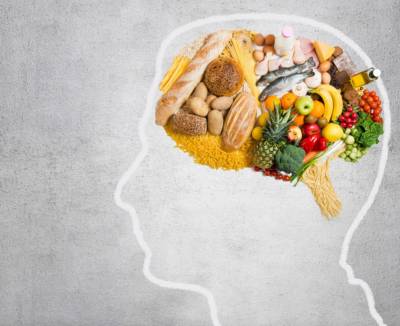
1 in 8 Americans experience food insecurity – a lack of consistent access to enough food for an active, healthy life.

As a part of Phi Kappa Psi’s ELEVATE initiative, and in co-ordinance with our service focus of Addressing Poverty, we recognize March as National Nutrition Month. As the topic of health & wellness continues to present itself as a “trend” across social media and pop culture, it is important to educate yourself on the basic facts regarding what constitutes as a healthy lifestyle.
The United States Department of Agriculture stresses that a healthy lifestyle is a very personal journey that is shaped by a number of factors, including age, situations, preferences, access to food, culture, traditions, and the personal decisions we make over time. Making sure your body has the right nutrients to support you is the main goal, and can be done through a balance rather than a strict regimented diet! Incorporating these tips into your daily life will build a better foundation for long-term health:
Focus on variety, amount, and nutrition.
Choose foods and beverages with less saturated fat, sodium, and added sugars.
Start with small changes to build healthier eating styles.
Support healthy eating for everyone.
Following these guidelines for personal health is crucial, however we must also consider than impoverished people do not have access to resources that will allow them to obtain long-term health. That is why during March, we encourage you to commit acts of service in your community to help children and adults in need. Food banks and community kitchens nation-wide work daily to not only feed the hungry, but to help educate those in need about nutrition, and to improve of the systemic issue of poverty and food deserts. You can learn more about how to participate in meaningful service work here.
While you’re changing your personal health habits and participating in service work to help food insecurity, you should also consider reducing your food waste by following these tips.
Phi Kappa Psi Members Encouraged to Make Nutrition a Priority
Celebrated each year during the month of March, National Nutrition Month® is an annual nutrition education and information campaign created by the Academy of Nutrition and Dietetics. It focuses on the importance of making informed food choices and developing sound eating and physical activity habits.
Coinciding with the Fraternity’s Poverty Focus, National Nutrition Month is a great opportunity to practice The Great Joy of Serving Others, whether on-campus or in the community. To get some background and ideas on how Phi Kappa Psi members can participate, we recently connected with Registered Dietitian Jenna Lee Hruban to get the skinny on why nutrition matters. Here is what she had to share.
Why is nutrition and access to fresh foods so important?
Nutrition is the foundation of life. Without nourishment, life ceases to exist. From hair to toenails, your body is meant to do one thing, which is to prolong life, and it will do so at all costs. Access to fresh foods or once fresh foods, also known as “whole foods,” provides us with the largest variety of nutrient-dense options to consume. Routine consumption of a variety of nutrient-dense foods will provide the body with what it needs to prolong life effectively and efficiently.
Are there specific guidelines to ensure balanced nutrition?
Absolutely! Look at any magazine, newspaper or website and especially on social media, and you’ll find an endless supply of guidelines to balanced nutrition. However, there’s a lot of mixed information out there, so do yourself a favor and check your source’s sources. Misinformation abounds when it comes to nutrition. The good news is there are plenty of sources of evidence-based balanced nutrition guidelines such as chooseMyPlate.gov or a Whole Foods Plant-Based (WFPB) diet. The partially bad news is that everybody is different, and what works for one, may not suit another. Generally, the chooseMyPlate guidelines will fit most of the populations’ needs. One can always seek out a Registered Dietitian for specific nutrition needs as well.
What are the benefits to healthy eating?
There are countless benefits to healthy eating. Most of us jump to weight being a consequence of healthful or non-healthful eating, but it’s deeper than that. We cannot perform at our best if we are malnourished, whether it be mental, emotional or physical.
How can people who are on budgets incorporate healthy eating and nutrition into their lives?
The biggest hurdle to healthy eating is the perceived cost associated with it, but many people on budgets can successfully incorporate a healthy eating lifestyle into their lives. It all begins with planning and preparation. If you can plan out your budget and at least half of your days’ meals, this becomes a breeze. First, decide what amount of your dollars you can afford to spend on food. Plan to spend the most in the produce and meat sections of the grocery store. Coincidentally, this is where you’ll also find the most nutrient-dense foods. Buy in bulk when you can, especially with your grain products like rice, pasta, and cereal. Only buy as much food as you’ll eat before it goes bad, and never go to the grocery store when you’re hungry. We are all guilty of food waste, which equals money waste. Secondly, make your list and double-check it. Also, check your stock of pantry staples before adding to your list or going to the store. Nobody needs three bottles of garlic powder. Shopping with a list can keep you tied to your budget and can help you with meal planning. Keep your meal plans simple, especially at the start. Once you determine what your tastes are, or maybe that you might even like cooking, then you can move onto more complex meals. Limit dining out, unless you’ve got the unicorn of a restaurant nearby, which includes nutrition-dense, fresh, properly cooked foods at low cost that delivers.
What are some ways to observe National Nutrition Month, whether on-campus or in your community?
There are a lot of ways that National Nutrition Month can be observed. This could include anything from volunteering at a food bank, hosting a philanthropic event to benefit a local food rescue organization or sponsoring a cooking demo or a Dial-a-Dietitian night with a campus radio station. The possibilities are endless. Also, don’t forget that food pantries need supplies year-round. It’s easy to donate. Many food pantries cannot keep their shelves stocked in the spring and summer months. Something else to consider is that everyone loves connecting over food and what a great way to build new connections than by hosting a dinner for patrons of your local food pantry or food bank. You might learn you have a lot in common with people you never realized you did. Finally, local food pantries, food banks and soup kitchens are always needing volunteers to help prepare and serve food, so signing up a group of brothers to participate can be a great way of giving back and building brotherhood.

Jenna Lee Hruban RD/CD, CDE has been practicing nutrition for over a decade, with a focus on weight management and diabetes. She has consulted with patients from all walks of life, in all stages and is always grateful for the opportunity to work with others on nutrition education. She is the proud mother of two children and a dog. She and her family love cooking and eating a varied, nutrient-dense spread.
